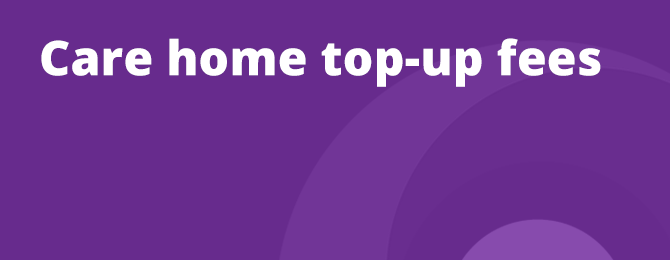Care home top-up fees

If your choice of care home accommodation costs more than the council is willing to pay, someone else can make up the difference between that figure and the home's fee. This is known as a third-party top-up fee.
What's a third-party top-up fee?
If the council is funding your care home place, they will allocate an amount of money, known as your personal budget, to meet your needs following a financial assessment.
If you choose a home that is more expensive than the amount the council will pay, you can still move there as long as someone, such as another family member, agrees to pay the difference, or the 'top-up fee'.
Should I pay for a relative's top-up fees?
Take financial advice before agreeing to pay someone's top-up fees.
- What would happen if your circumstances changed and you couldn't afford the top-up?
- Care home fees often increase every year, but the council doesn't always increase their funding by the same amount. Therefore, you could find yourself paying more each year to cover the difference in fees.
Paying the top-up
If you're not including your property in the first 12 weeks of your permanent stay in a care home or if you have entered into a deferred payment agreement with the council, you can pay your top-up payment. Alternatively, you can ask someone else (a third party) to pay it from their income or savings. The person paying the top-up must be willing and capable of meeting the cost for the expected duration of your stay in the care home, which could be for a long time.
The council will provide you or the third party with all the necessary information and advice to ensure you or they understand the terms and conditions of entering into a top-up agreement. They will also provide you with an estimate of the potential costs that may be incurred.
Agreeing the top-up
Before entering into a top-up arrangement, the council needs to ensure that the payment is both affordable and sustainable.
If they are not satisfied, you may not be able to move into the home of your choice, and they will discuss finding accommodation that is affordable within your budget.
However, if they are satisfied and you wish to proceed, you (or a third party) will need to enter into a written agreement with us to guarantee the top-up payment for your chosen accommodation.
This agreement is a legally binding document that outlines the full terms and conditions, including the weekly top-up payment required, a projection of potential costs you or the third party may incur, when the council will review the agreement, what would happen if you or the third party had a change in financial circumstances or could no longer afford to pay the top-up, and what would happen if the cost of your accommodation changes.
Once the agreement is in place, the council will monitor the top-up payments. If the payment is not made, they will contact you to discuss further action, which may include seeking to recover unpaid amounts or making alternative arrangements for your accommodation.
Who can help me?
If you have any questions regarding payment for your care, please contact the Client Financial Services Team by emailing cfservices@plymouth.gov.uk.
If you prefer to speak with someone, please call 01752 668000.
More information
Continue reading
- Paying for your care and finances
- Personal budgets
- Direct payments and prepaid cards
- How to pay your care invoice
- Independent financial advice on paying for care
- Deferred payments for care home costs
- Care home top-up fees
- Employing a Personal Assistant
Is the information correct?
Let us know if the information on this page is wrong and needs to be updated.
Want to create a page on the Plymouth Online Directory? Register for free and add a page; it only takes a few minutes.




